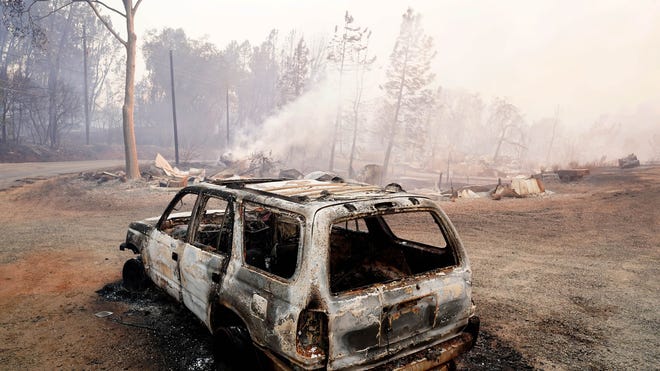
A fire that was reportedly started when a man pushed a burning car into a ditch in a Northern California park on Wednesday has quickly grown into the largest fire currently burning in the West and one of the largest in state history.
The southern tip of the Park Fire is about 90 miles north of Sacramento, and as of Saturday afternoon the fire had burned roughly 350,000 acres, according to Cal Fire. It is currently the seventh-largest wildfire in California history, and it has also produced its own clouds and fire swirls.
The fire has more than doubled in size since it ravaged an area the size of Chicago on Friday morning.
Prosecutors allege the fire started when Ronnie Stout plunged his mother’s car 60 feet down an embankment near Alligator Hole in Chico’s Upper Bidwell Park, igniting a fire that spread northward through the Sierra Nevada foothills.

Officials say triple-digit temperatures, low humidity and gusty winds contributed to the rapid growth of the Park Fire, which burned an area larger than the city of Los Angeles on Saturday. So far, the Park Fire has damaged 134 structures, according to a statement from Cal Fire on Saturday afternoon.
Cal Fire spokeswoman Kirsten Larson told USA Today on Saturday that the terrain in the area is steep and rocky, and there are few roads for firefighters to access and fight the blaze.
Temperatures dropped Saturday, with highs in the low 80s Fahrenheit and high humidity, according to the National Weather Service’s Sacramento office. Hot weather is expected to return next week, but cooler conditions are expected to persist for the next few days.
Officials hope the conditions will give their roughly 2,500 firefighters the respite they need to contain the fire’s spread from Butte County into Tehama County, where most of the blaze is currently burning grass, brush, timber and dead vegetation.
Evacuation orders were issued from eastern Tehama County to the Shasta County line, about 50 miles from the fire, including small communities approaching Lassen Volcanic National Park.
Evacuation orders and warnings remained in effect through Friday night in Butte County, the sheriff’s office said, including for Magalia, a town in the foothills east of Chico. Magalia is next to Paradise, a town in California that was destroyed by the Camp Fire in 2018, which destroyed 14,000 homes and killed 85 people. The Camp Fire, which was started by a fault in a Pacific Gas & Electric power line, burned a peak of 153,336 acres.
In total, the Park Fire prompted authorities to evacuate about 8,700 people from their homes, Larson said, and the Butte County fairgrounds, churches and rodeo arena were converted into shelters and animal shelters.
Fire extremes, climate change
The Park Fire has burned through relatively remote areas that haven’t recently burned, said Daniel Swain, a meteorologist at the University of California, Los Angeles, as it spread from grasslands in the west toward the Central Valley and east into dense forests, including logged areas, in the Sierra Nevada mountains.
At the same time, this month was the hottest on record for the region, Swain said. This has not been a particularly dry year, nor has a severe drought affected the region. But the heat dried out the leaves quickly, providing fuel for the fires within three days, Swain said.
“The fire has spread incredibly fast and has consistently demonstrated extreme behavior since it began,” he said, noting that the Park Fire has produced its own thunderstorm-like clouds and one or two fire swirls that were captured on video.
Hotter and drier conditions caused by climate change are making it easier for large wildfires to grow, Swain said. Not only are fires more likely to burn overnight, but the fires themselves are creating wind patterns that intensify the flames, which can cause fires like the Park Fire to spread much faster.
More than 100 large wildfires are burning across 10 western states and Alaska, scorching more than 2 million acres, according to the National Joint Fire Center.
Contributing writers: Christopher Kang and Dinah Pulver, USA TODAY


